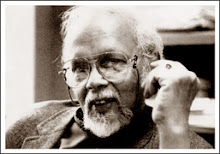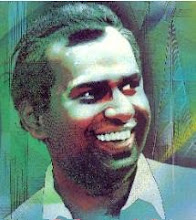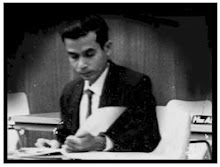Source: kusalperera.blogspot
Date: 15th October, 2005

Ocean full of water isn’t enough to cry for you – that probably was what the frog murmured, its divine love for the mouse sitting silent, when they had to part. Probably many thought that way too, when Simon Navagattegama departed (09th Oct.) for good. A bit too soon though, with only six decades and a little more than a half behind him. There wasn’t many that cold and breezy wet evening, who had pondered over Simon’s literature to dream into his first short story collection published in 1972, titled “Saagara Jalaya Madi Henduwa Oba Sandha”. And there after, he simply grew unnoticed and without noise as an excellent prose writer, with just half a dozen novels, no literary critic dared to dissect in full.
Simon was at his best, as a creative writer. Simon’s haunting romanticism was very much different to prose of all others. He had many layers a reader could dig into, in his creations and his metaphors were all unrealistically realistic. And that was Simon in real life too. Elusive, yet so much attached in his relationships. The Simon I came to know quite closely.
I first met “Sayima”, as we very fondly called him, some where in 1973, when he was lodging with some boarders down Initium Road, Dehiwala, in an old house over looking the sea. His school mate, another silent but talented dramatist Sumana Aloka Bandara, was in there too. All others were far away from art and literature, enjoying most evenings, till the sea went dry. Sayima wrote his stage play “Pusloadung” while in there. It was banned after 08 public shows by the Coalition government of Madam Sirimavo B. Though a school teacher then, a routine-less character, Sayima was known to frequent Lionel Wendt theatre instead of going to teach. And some one had chalked on his often closed room door, “Lionel Wendt – Simon also went”.
Sayima was an enormous dreamer. He had enough to dream about too. For he grew from the closeted wilderness of Navagattegama, Anamaduwa, through Peradeniya and Vidyodaya Universities and then through the extravagant and sickening city culture to absorb everything from the old Soviet culture to the modern Western life.
His was an unusual journey through life and history. He sat for his Grade Five scholarship exam in 1948, from his village school. His father had refused Rathnayake Head Master, when he wanted the little fellow to sit the scholarship exam. “Who will look after my buffalo….after me ?” the elderly farmer had asked. Yet in a remote world that knew nothing about feminism, the mother always took decisions and Simon was tutored to sit the exam. Sayima had his own slow rhythmic style of rattling off old tales like that, sitting on the bund of the reservoir, his father and other villagers had dug to collect rain water for their cultivations, when they were robust youth. “I was startled, when the Head Master’s wife, a teacher in our school told me I could go to Sanda-lankawa to sit the exam.” Sayima once told me. He had thought Sandalankawa was yet another country. His was the school, the villagers and their children, the buffaloes they chased after, the tank they ran to bathe and the thick black forest beyond, that howled mysteriously in the night.
His first trip in a “railluwa” was when he was taken by Rathnayake Head Master to Mahawa Central College, still with his neatly combed long hair knotted into a plain bundle over his nape. He became the first pupil for long years to come, to pass the Grade Five scholarship exam from his village school. The trip included a long journey from Navagattegama to Galgamuwa by bullock cart and then in a coal fed, smoking train, the railluwa. “We had a Tami
 l master for English”, he told me. “He was also the hostel master”. They had to speak in English in the hostel, or be penalised a cent for every Sinhala word spoken. And when the petromax lamp was blown off at 10 in the night, the boy in the next bed would creep up to slowly pull Sayima’s long hair laid free in the night. Then, his scream “Amme” cost him a cent. Thus came the day he visited a barber for the first time.
l master for English”, he told me. “He was also the hostel master”. They had to speak in English in the hostel, or be penalised a cent for every Sinhala word spoken. And when the petromax lamp was blown off at 10 in the night, the boy in the next bed would creep up to slowly pull Sayima’s long hair laid free in the night. Then, his scream “Amme” cost him a cent. Thus came the day he visited a barber for the first time.The last time I met Sayima, he was feeble looking but was yet planning to write “something”. That was about an year ago. I asked what it would be and he said, “Don’t know, but there’s something in me, I want to tell others.” He had plenty to tell others. A voracious reader, I knew he read a heavy load of Arabian tales and Latin history. He read Buddhist scripts and Soviet literature. Well, he had read whole libraries.
His childhood innocence, the village, the universities, city pavements, socialism, capitalism, existentialism, post-modernism and his ever rebelling over read psyche, all that in a single bundle of contradictory, complex knots, Saimon Navagattegama is no more. But if, fate had it the other way round, he would light another cigarette from the one he throws away and dream about another story for tomorrow. Not me, nor any other, I know. But that’s Sayima who lived alone, yet enjoying the whole world.




































No comments:
Post a Comment